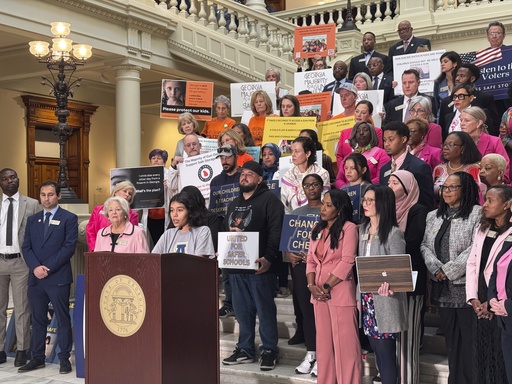
ATLANTA — Following the introduction of new school safety legislation by Georgia Republican House Speaker Jon Burns, families from Apalachee High School and Democratic lawmakers have expressed a desire for more comprehensive gun safety measures. This discussion comes in the wake of a tragic mass shooting incident at the school northeast of Atlanta, where a 14-year-old has been charged with the deaths of two teachers and two students, in addition to injuring many others last September 4.
On the day of the shooting, student Isabel Trejo was focused on her math exam when the violence erupted. She recounted to lawmakers how the moments that followed felt timeless as she huddled under her desk, bracing for the worst as her teacher, Richard “Ricky” Aspinwall, later fell victim to the attack. Trejo, along with families who experienced this tragedy and advocate Ishmael “Junior” Angulo, was present at the Capitol to support calls for stricter gun regulations led by Democratic Representative Michelle Au.
While applauding Burns’ school safety initiatives, they insisted on the need for gun safety laws to thwart future incidents. “Speaker Burns focuses on responses to violence already occurring in schools, whereas Dr. Au’s proposal aims to keep firearms out of schools from the outset,” stated Layla Renee Contreras, a community advocate with Change for Chee, formed post-shooting to promote school safety.
Research from Johns Hopkins University highlighted that Georgia had a significant gun homicide rate in 2022, ranking eighth nationally, with guns being the primary cause of death among young individuals aged 1 to 17. Efforts by Democrats to push for gun control measures have generally faced obstacles, as the Republican-led legislature has rebuffed most proposals. Governor Brian Kemp, a staunch defender of gun rights, signed legislation in 2022 that permits individuals to carry handguns without needing a state permit, garnering him both political support and national recognition.
Yet, some Democrats see potential for change in light of the Apalachee shooting. “The families affected by the tragedy in Apalachee and Barrow County remain deeply impacted, and it is our duty to prioritize this issue despite the formidable challenges to progress,” Au remarked.
To encourage safe storage of firearms, Au has proposed tax credits of up to $300 for items such as gun safes and trigger locks, a notion that Burns also supports. While a bipartisan group previously promoted these tax credits, attempts in both legislative chambers fell short. The proposed background checks introduced by Au are also unlikely to garner Republican backing.
Au’s focus extends to legislation making it a criminal offense to allow a child access to unsecured firearms, a stance shared by Senator Elena Parent from Atlanta. This legislation would also require businesses to display notices regarding these safety regulations. The 14-year-old implicated in the Apalachee shooting reportedly obtained the weapon from his father, who now faces murder charges alongside his son.
In addition to this, Senator Parent has proposed barring individuals with family violence convictions from firearm ownership. She also introduced legislation mandating a formal process for individuals previously hospitalized for mental health issues seeking to erase their records, a stipulation currently governed by a five-year automatic wipe period from Georgia’s crime information center.
Senator Emanuel Jones from Decatur has also contributed by proposing the establishment of an emergency alert system to address threats. His plan includes mandates for schools to provide mental health resources to students identified as making threats, alongside a statewide initiative for disseminating gun safety information.
During a recent gathering, the father of teacher Aspinwall shared his support for Burns’ proposals, which advocate for improved communication between schools and law enforcement regarding potential threats and for connecting at-risk students with counseling resources. Last month, the governor suggested an additional $50 million in funding for school safety; however, this allocation did not encompass support for counselors or mental health programs that have been called for by officials in the field.

